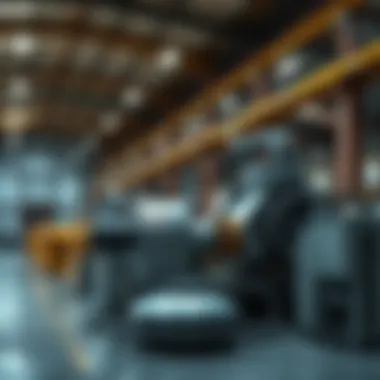Discovering Key Players in Al Quoz Industrial Area


Intro
In the heart of Dubai, the Al Quoz Industrial Area serves as a vibrant nucleus for industrial activity, embodying the city’s rapid economic evolution. This area is more than a point on a map; it’s a dynamic environment where businesses flourish, driven by innovation and a strategic geographical location. With its diverse landscape comprised of warehouses, showrooms, and production facilities, Al Quoz has cemented itself as an essential player in the UAE’s thriving economy.
Within these bustling streets, three particular companies have emerged as beacons of success, each contributing uniquely to the local ecosystem. Their stories not only reflect their individual missions and market strategies but also weave into the fabric of Al Quoz as a whole. Understanding their operations gives insight into broader trends shaping this part of the industrial sector.
Here, we aim to delve into these firms, exploring their journeys, business models, and the insights they provide into the current market dynamics of Al Quoz. Through this examination, stakeholders, be they investors, realtors, or entrepreneurs, will glean valuable information on potential growth trajectories within this industrial landscape.
Preface to Al Quoz Industrial Area
The Al Quoz Industrial Area stands as a pivotal segment of Dubai's dynamic landscape, serving as a vital artery for commerce and industry within the city. As urbanization sweeps through the region, Al Quoz showcases a blend of industry and innovation, attracting various businesses, from manufacturing giants to niche art studios. Understanding this area is crucial not only for potential investors but also for local policymakers, real estate agents, and businesses looking to tap into a fertile ground ripe with opportunities.
Al Quoz is characterized by its strategic location, which makes it a desirable hub for logistics and transport. This accessibility enhances its appeal, facilitating the smooth movement of goods and resources to and from different parts of the emirate. With the pulse of industry thrumming in this zone, it becomes essential to examine how geographical and economic factors converge here, thereby influencing both local and regional markets.
Geographic and Economic Significance
Nestled conveniently between major roads and close to the heart of Dubai, Al Quoz offers remarkable geographic advantages. The area sprawls across well-appointed zones that cater not only to industrial activities but also to retail and commercial enterprises. This merges with Dubai's burgeoning economy, which has seen consistent growth figures over the past years.
The economic significance of Al Quoz can be emphasized through the following points:
- Diverse Business Environment: The area hosts a variety of industries, including logistics, manufacturing, and technology sectors, creating a multifaceted economic ecosystem.
- Job Creation: With a plethora of companies establishing their operations here, employment opportunities flourish, directly impacting the local populace.
- Supportive Infrastructure: Adequate infrastructure and utilities support businesses, facilitating operational efficiency and effectiveness.
As businesses thrive in Al Quoz, the economic ripple effects extend throughout Dubai, contributing to overall growth and stability.
Historical Context
The history of Al Quoz is woven into the fabric of Dubai's extraordinary transformation from a quiet trading port into a thriving metropolis. Initially, the area was predominantly agricultural before undergoing significant changes in the late 20th century as part of Dubai’s comprehensive urban development initiatives.
Notably, the industrialization of Al Quoz began in the 1980s when governmental policies encouraged the establishment of free zones aimed at attracting foreign investments. This shift catalyzed industrial growth, leading to the establishment of several key businesses and factories that continue to play pivotal roles in the local economy today.
Moreover, the historical context of Al Quoz reveals:
- Strategic Development Plans: Government initiatives paved the way for infrastructure improvement that has been crucial for business growth.
- Cultural Evolution: The transformation of Al Quoz dovetails with the rise of Dubai as a cultural beacon, evident in the art galleries and creative spaces emerging in the area.
Understanding the historical context of Al Quoz not only sheds light on its present condition but also illustrates its trajectory as a future leader in Dubai’s industrial narrative.
Overview of the Industrial Sector in Dubai
The industrial sector holds a pivotal role in Dubai's overall economic framework. Nestled amid skyscrapers and bustling markets, this sector acts as a backbone, driving growth and providing a myriad of employment opportunities. The growth trajectory of Dubai's economy has been largely fueled by its strategic initiatives and investments in industrial zones, making it a magnet for local and international entrepreneurs.
Role of Industries in Dubai’s Economy
Industries in Dubai do more than just provide jobs; they serve as a vital engine for innovation and development. Key points to consider include:
- Diversification: The industrial landscape in Dubai is marked by a steady shift away from traditional oil dependency. By placing emphasis on manufacturing and technology, the region broadens its economic foundation, ensuring resilience against oil price fluctuations.
- Contribution to GDP: The industrial sector consistently contributes a substantial portion to Dubai's GDP, reinforcing its status as a leading business hub. This includes sectors such as textiles, food processing, and electronics, each adding to the rich tapestry of economic activity.
- Employment Generation: With factories and plants peppered throughout the landscape, this sector provides thousands of jobs. These positions span various skill levels, engaging both the local workforce and expatriates alike, thereby contributing to the diversity of the labor market.
- Innovation and Technology: Industries are increasingly adopting automation and modern technologies to streamline processes. This not only enhances productivity but also sparks a culture of innovation, where businesses are encouraged to design novel solutions to meet emerging market needs.
Additionally, sectors such as logistics and warehousing amplify the industrial base by facilitating efficient distribution channels, thus strengthening local and global trade ties. As the industrial sector evolves, it pushes the boundaries of what’s possible, encouraging both local residents and foreign investors to contribute to Dubai's growth story.
Industrial Zones and Their Importance
Industrial zones within Dubai, like Al Quoz, serve as unique ecosystems that bolster the industrial sector's growth. Understanding their importance involves recognizing several factors:


- Specialization: Each zone often specializes in certain industries which promotes collaboration and knowledge-sharing. For instance, Al Quoz is known primarily for its art and design studios, attracting creative businesses that thrive in such a collective atmosphere.
- Infrastructure Support: These zones are equipped with essential infrastructure, including access to advanced transportation networks, utilities, and communication systems, enabling businesses to operate smoothly and efficiently.
- Regulatory Benefits: Many industrial zones offer incentives such as reduced taxes or simplified processes for setting up businesses. This legal framework tends to foster an entrepreneurial spirit, enticing new players to enter the market.
- Proximity to Markets: Locations like Al Quoz provide strategic advantages, allowing companies quick access to consumers and suppliers. This proximity not only reduces overhead costs but also enhances response times to market demands.
In summary, industrial zones are more than just geographical locations; they act as incubators for innovation and economic growth. By understanding their role, stakeholders can better appreciate the intricate web connecting business operations with Dubai's broader economic landscape.
Company Profiles: A Closer Look
A deep dive into the profiles of noteworthy companies in Al Quoz is crucial for understanding the area’s industrial fabric. Each company contributes uniquely to the local economy and plays a significant role in the broader context of Dubai's industrial vision. This section will highlight how their operations shape not just their individual markets but also the economic landscape of the region. This insight will be beneficial for investors, realtors, buyers, homeowners, and advisors who are looking to comprehend the intricate dynamics at play in the Al Quoz Industrial Area.
First Company: Operations and Impact
Founding and Growth
The initial journey of the first company, let's say Arabian Metal Works, traces back to the early 2000s. They started as a small-scale operation, focusing primarily on metal fabrication. Over the years, they bulbously expanded their product lines and services due to increasing demand in various sectors. A key characteristic of their growth has been their adaptability to changing market needs, which is a crucial aspect for survival in today's fast-paced world. Their relentless pursuit of quality and customer satisfaction has helped them carve out a respectable niche.
The unique feature about their founding is how they leveraged local resources and skilled labor to foster a community-centric model, which not only elevated their brand but also provided to the local workforce. This has generally been a win-win scenario for both the company and the community it operates in.
Market Position
Arabian Metal Works currently holds a commendable position in the industrial sector of Dubai. Their strategic location in Al Quoz allows them to cater effectively to clients in various segments, such as construction, automotive, and furniture industries. The company's market position stands out due to its commitment to innovation—investing heavily in modern machinery and processes that not only enhance efficiency but also improve product quality.
A notable aspect of their market stance is that they are often viewed as a solution provider rather than just a service provider. This gives them a distinct competitive edge, as they are able to create tailored solutions for clients, thus fostering customer loyalty. However, competition from emerging players remains a challenge as they strive to remain in the spotlight.
Contribution to Local Economy
Arabian Metal Works' contribution to the local economy cannot be understated. Employing over 300 local workers demonstrates their commitment to supporting the workforce directly. They actively engage in local sourcing for their raw materials, which also enhances the regional supply chain.
Furthermore, their efforts in community development—like participating in vocational trainings and workshops—have played a pivotal role in elevating the skill levels within the population, which is mutually beneficial. They are not just contributing economically but socially, hence their influence spills over into many positive aspects of life within the local environment.
Second Company: Business Model and Innovation
Strategic Initiatives
The second company, GreenTech Solutions, is a prime example of innovation in the Al Quoz area. Their strategic initiatives, aimed at integrating renewable energy solutions into the industrial landscape, reflect a proactive approach to environmental responsibilities. With the global trend moving towards sustainability, they have tailored their operations in a way that not only fits this standard but also sets them apart.
One distinctive aspect of their strategy is the collaboration with local governments to implement energy-saving technologies across various sectors. This has garnered them recognition and partnerships with governmental bodies. Their initiative not only emphasizes profit but also places importance on sustainability, which is increasingly attractive for investors looking for socially responsible ventures.
Challenges Faced
Despite their strides in sustainability, GreenTech Solutions frequently navigates a maze of challenges. Regulatory hurdles, such as securing permits for new technologies, have been a thorn in their side. Moreover, fluctuating costs of raw materials, especially in the renewable sector, pose financial risks that must be carefully managed to protect margins.
A key characteristic of their challenges is the constant need for technology upgrades and the associated costs. This can sometimes slow down their progress or lead to a reevaluation of their expansion strategies. While these challenges could deter some, they are often viewed as opportunities for growth by the team at GreenTech.
Partnerships and Collaborations
Strategically, GreenTech Solutions has formed multiple partnerships with educational institutions and other corporations that are focused on sustainability. This collaboration helps them stay ahead of the curve in technological innovations and boosts their credibility in a competitive market. A unique element here is their joint research initiatives, enabling them to experiment with new renewable energy solutions.
Such partnerships not only allow for pooling of resources but also can lead to fruitful results that are beneficial to all parties involved. However, these collaborations require continuous management to ensure that all stakeholders are aligned, which can sometimes introduce complexity into operations.
Third Company: Future Prospects
Technology Integration


The third company, Digital Dynamics, is paving its own path in the fast-evolving tech sector. Their emphasis on technology integration into their operations speaks volumes about their foresight. They have embraced AI and IoT technologies to enhance efficiency and provide enhanced services to their clients.
One key aspect frequently discussed in relation to technology integration is its impact on productivity and cost-saving. Digital Dynamics has reported a significant increase in efficiency metrics after implementing these technologies. However, the initial investment in such technologies can be daunting for firms, making it essential to analyze potential ROI thoroughly.
Sustainability Practices
Digital Dynamics doesn’t just stop at technology; they are also ahead of the curve in sustainability practices. By implementing green technologies, they contribute to the environmental goals of Dubai. One unique feature of their approach to sustainability is their commitment to using recycled materials in their production processes. This has opened up new avenues for marketing their brand as eco-friendly, appealing to a consumer base that prioritizes sustainability.
While these practices generally enhance their brand image, they often require continuous investment and improvement to meet increasing regulatory standards. Balancing costs while adhering to sustainability practices can be challenging yet rewarding.
Market Expansion Plans
Looking ahead, Digital Dynamics has ambitious market expansion plans. Plans to penetrate international markets, particularly in the Middle East and Southeast Asia, positions them as a strong player on a larger scale. This desire for growth aligns with the industrial ambitions of Dubai and its goal to become a robust global hub.
A distinctive feature here is how they are leveraging their tech expertise to create customized solutions for diverse markets, which could give them significant advantages over competitors. However, expanding into new markets is always fraught with uncertainties—cultural, regulatory, and economic factors can influence outcomes, and careful planning is necessary to navigate these challenges.
Economic Contributions of Notable Companies
The Al Quoz Industrial Area serves as a vital cog in the larger wheel of Dubai's economy. Here, notable companies contribute significantly not just through their operations but also by weaving intricate connections in various sectors. Understanding these contributions sheds light on how businesses not only thrive but also enhance the economic landscape around them.
Employment Opportunities
When we talk about employment in Al Quoz, we're diving into a bustling market where many people find their livelihoods. The companies here are not just businesses; they're job creators. For instance, industries like Al Quoz Precision and Arabian Packaging have employed thousands, supporting skilled workers while also providing entry-level positions. This multiplier effect expands across the community.
- High employment rates lead to increased consumer spending.
- Local businesses benefit as employees spend their earnings within the area.
- Companies often engage in training programs which bolster skills and enhance overall labor market quality.
Moreover, many of these firms focus on hiring local talent, which aligns with Dubai’s vision for economic diversification and sustainability. This not only fosters a sense of community but also enhances productivity as local knowledge and expertise are tapped into.
Investment in Infrastructure
Investment in infrastructure is an essential part of the economic blueprint for the Al Quoz Industrial Area. Companies play a pivotal role in shaping this aspect. By investing in their facilities, businesses not only improve their operational efficiency but also contribute to the area's overall development.
- Infrastructure investments can include:
- Upgrading transport logistics, which simplifies the movement of goods.
- Developing state-of-the-art manufacturing facilities, setting a precedent in innovation.
- Collaborating with the government on public infrastructure projects, which enhances accessibility and services in the region.
These investments generate an environment conducive for further business growth and attract more companies. As firms modernize and expand their operations, they indirectly uplift other sectors like construction and technology, creating a more robust economic ecosystem.
"In every challenge, there's an opportunity. Companies in Al Quoz exemplify this through their commitment to not just grow, but to build a better environment for everyone."
Together, the contributions regarding employment and infrastructure underscore the importance of the companies in making Al Quoz a formidable player in Dubai’s industrial landscape. Their ongoing success resonates throughout the economy, creating ripples that can lead to larger societal transformations.
Challenges in the Al Quoz Industrial Area
The Al Quoz Industrial Area, while bustling with opportunity, is not without its challenges. Understanding these challenges is crucial for stakeholders, including investors, business owners, and policymakers, as they navigate this vibrant hub. The complexities in regulation and environment can pose significant barriers that need addressing to ensure sustainable growth.
Regulatory Challenges
Regulations in the Al Quoz Industrial Area can sometimes feel like a maze. Different entities impose various regulations that companies must obey. For instance, businesses in sectors like manufacturing may have to meet stringent requirements concerning safety and quality standards, which can vary widely based on the governmental body overseeing them.
Moreover, the licensing process can be cumbersome. Entrepreneurs often find themselves mired in paperwork and waiting times that can stretch for weeks or even months. This slow and often unclear process can lead to financial strain for new businesses that rely heavily on swift market entry. There have been murmurs among local business owners about the need for a more streamlined approach.


Strategies to Mitigate Regulatory Burdens:
- Stay Informed: Regularly attending workshops or seminars hosted by local business councils can provide insights into navigating regulations more effectively.
- Engage Legal Advisors: Having an expert guide through the regulatory landscape can prevent missteps that could lead to costly penalties.
The bottom line is obvious: clarity and efficiency in regulation can facilitate smoother operations, sparing businesses from unnecessary headaches.
Environmental Concerns
As industries expand, environmental factors increasingly come to the fore. The Al Quoz Industrial Area confronts real challenges in balancing industrial progress with ecological sustainability. Environmental laws are tightening, as the global push for greener practices gains traction. Companies now face pressure not just from regulations but also from the public and eco-activists.
Air and water pollution are two critical issues that have been under scrutiny. Industrial processes, if not managed properly, can lead to contaminants entering waterways and excessive emissions into the atmosphere. This has prompted discussions around the need for more sustainable operational practices among companies in the area.
Key Steps for Enhancing Environmental Responsibility:
- Adopt Green Technologies: Investing in energy-efficient machinery can reduce waste and carbon footprints.
- Waste Management Initiatives: Companies can collaborate with waste management firms to recycle and properly dispose of industrial waste.
- Employee Training Programs: Raising awareness among employees about environmental responsibility creates a culture of sustainability from the ground up.
To sum up, addressing these challenges is not an option; it is a necessity. Future growth hinges on a proactive approach to both regulatory and environmental hurdles. Doing so will ensure that the Al Quoz Industrial Area continues to thrive, attracting businesses and investors alike while being mindful of its ecological footprint.
Looking Toward the Future
The Al Quoz Industrial Area stands as a testament to Dubai's ability to evolve and respond to the shifting dynamics of the global economy. In this section, we will delve into the significance of anticipating future trends, the potential pathways for industrial growth, and the strategies that could help stakeholders navigate the fluid landscape of business in the area. Understanding these elements is crucial for investors, developers, and policymakers alike as they aim to optimize return on investment and bolster the region's economic standing.
Trends in Industrial Development
Over the next few years, Al Quoz is poised to witness notable transformations in its industrial sector. A few key trends stand out:
- Sustainability Focus: Companies are increasingly prioritizing eco-friendly practices. This includes the integration of renewable energy sources and sustainable materials into their operations. Firms in Al Quoz are expected to adopt green technologies that not only reduce their carbon footprint but also appeal to socially conscious consumers.
- Technological Advancements: The adoption of smart technologies is predicted to revolutionize productivity in the industrial landscape. Automation and data analytics can streamline processes, optimize supply chains, and improve overall efficiency. For instance, the rise of the Internet of Things (IoT) could enable real-time monitoring of machinery, reducing downtime and enhancing operational performance.
- Diverse Industry Growth: The diversification of industries present in Al Quoz will become vital. Sectors such as manufacturing, logistics, and creative industries are expanding, driven by both local demand and export potential. This variety not only strengthens the economic base but also creates a more resilient industrial ecosystem.
"A future-focused approach is no longer optional. Adaptation is the name of the game in Al Quoz."
Policy Recommendations for Growth
In light of emerging trends, several policy recommendations can foster sustainable growth in Al Quoz:
- Enhancing Infrastructure: Continued investment in transport and logistics infrastructure is essential. Improving road connectivity and access to major trade routes will enhance the movement of goods and services, driving efficiency.
- Support for Innovation: Establishing innovation hubs and offering incentives for research and development can stimulate creativity within the industrial sector. Encouraging interdisciplinary collaboration between tech startups and established businesses can lead to groundbreaking solutions.
- Regulatory Frameworks: Adjusting regulations to simplify business operations and provide more clarity can attract new businesses. Policymakers should focus on creating an environment that allows for both growth and compliance with sustainability standards.
- Workforce Development: Training programs that align workforce skills with industry needs will be crucial. Investments in education that emphasize STEM fields can increase local talent capacity, ensuring that Al Quoz companies have access to skilled labor.
As Al Quoz navigates the evolution of its industrial landscape, these recommendations can guide stakeholders toward making sensible investments that promote long-term growth. The ability to anticipate changes and make strategic decisions will likely set successful companies apart in an increasingly competitive market.
Closure: The Industrial Heart of Dubai
The Al Quoz Industrial Area stands as a pivotal segment of Dubai's economy, weaving the delicate threads of commerce and industry into a fabric that supports the broader landscape of development. This conclusion encapsulates the vital themes explored throughout this article, emphasizing the regional significance and the prospects laid out by the notable companies that call this area home.
Summary of Key Insights
When reflecting on the insights shared, several crucial points emerge:
- Innovative Resilience: The three showcased companies reveal a pattern of adaptation and innovation, tackling challenges head-on and transforming them into opportunities. Their strategies illustrate how agility in a competitive market can propel sustained growth.
- Job Creation: Employment generation is a cornerstone of these businesses. Each company not only contributes to job openings but plays a crucial role in skills development and fostering employment-related training programs in the community.
- Economic Ripple Effect: The contributions of these firms extend beyond their operations; they stimulate local businesses and services, thereby enhancing the overall economic vitality of Dubai. This can lead to increased real estate demand and further investment in infrastructure, providing a holistic benefit.
"A robust industrial sector like that of Al Quoz is not just the backbone but the very heartbeat of Dubai’s economic landscape."
In sum, the intertwining of these elements constructs a reliable narrative of growth, stability, and influence, underscoring the significance of the Al Quoz Industrial Area.
Final Thoughts on Future Growth
Looking towards the horizon, the future promises to be an exciting one for the Al Quoz Industrial Area. While challenges persist, such as regulatory pressures and environmental considerations, opportunities for growth shimmer brightly on the landscape. Here are a couple of key anticipations:
- Sustainability Initiatives: With the rising global consciousness around sustainability, companies based in Al Quoz are likely to double down on eco-friendly practices. This commitment not only aligns with global trends but also enhances their market position.
- Technological Advancements: The integration of technology is poised to transform operations. Smart manufacturing and automation could streamline processes and enhance productivity. Such advancements will reinforce Dubai’s positioning as a leader in industrial innovation.
In essence, as Dubai continues to evolve, so too will the Al Quoz Industrial Area, solidifying its status as a core industrial nucleus and contributing significantly to the emirate’s broader economic narrative.















